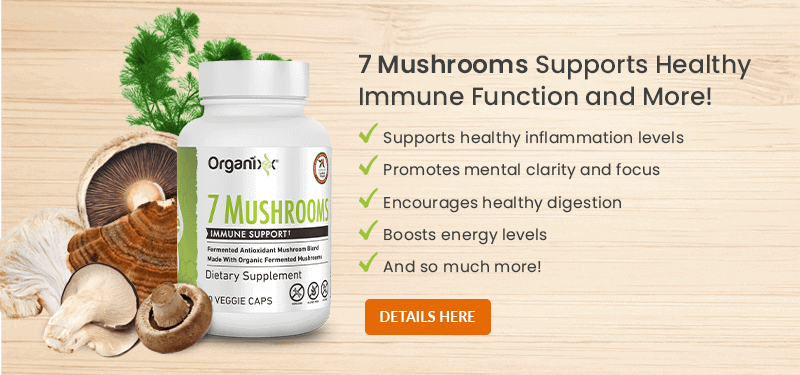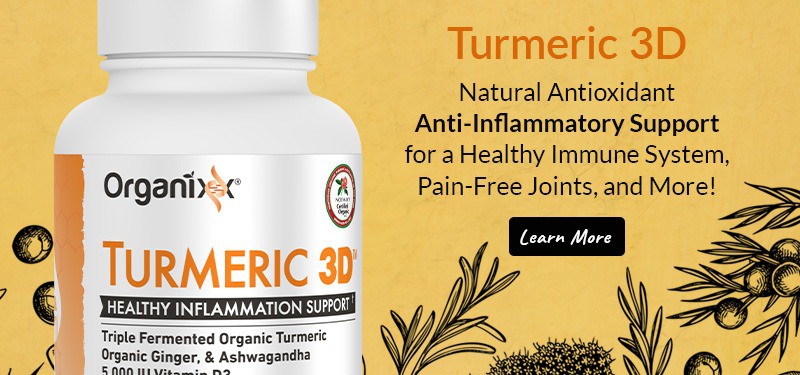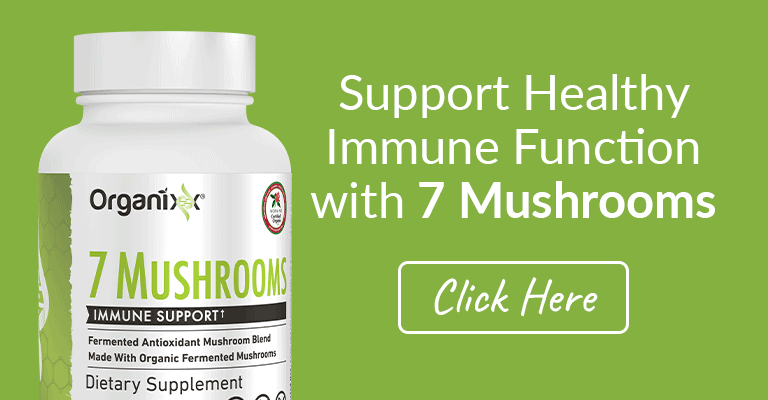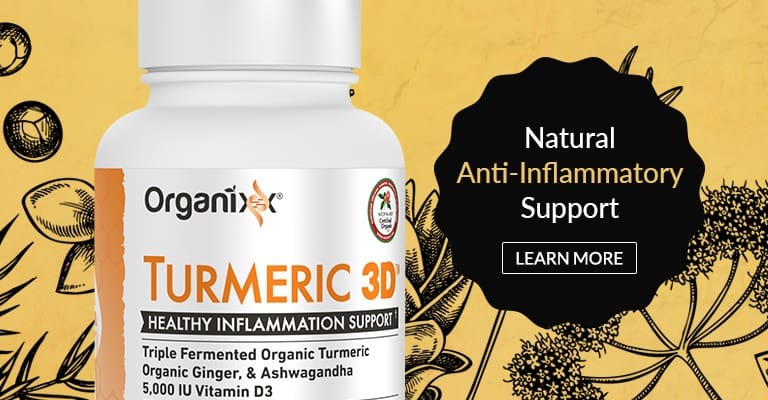Video Transcript:
Today, I’m going to share with you one of the most powerful functional mushrooms that can help reduce your risk of heart disease, and heart attack, and stroke. This is not as well advertised, but definitely, we have a lot of research regarding this functional mushroom, and it is chaga and you’re going to find chaga in our 7M+. I love it. I love it. I love it. Chaga is a powerful Siberian mushroom that has powerful blood pressure-lowering and lipid-reducing influences on your cardiovascular health.
And this is really quite interesting. In the span of our talk already, there have been four or five heart attacks. Every 40 seconds, an individual suffers from a heart attack. One in five individuals are at risk of a heart attack.
That is a crazy, crazy statistic, but I’m going to share with you how you can use chaga to reduce unhealthy LDL levels that tend to be the leading factor, the underlying current, that causes clogging of your arteries and even is an underlying factor with cardiovascular impairment like arterial sclerosis. Also, chaga can, overall, reduce your inflammatory levels, which is a huge factor in terms of supporting your heart health.
Research Shows Chaga Reduces Inflammation & LDL Levels
What we know … Chaga has been studied [1], so there’s been several different scientific research pieces that have identified that when patients take chaga, their LDL levels are reduced.
Now there’s a direct correlation to this. LDL tends to be billed as like, “the bad cholesterol” and not all cholesterol is bad. HDL kind of they’ll label it like, “the helping HDL,” “the helper cholesterol.” You want more HDL than you want LDL, and a lot of times people are flip-flopped or they’re really low on HDL and moderate on LDL, but you want the ratio to be more prominent in HDL.
Free Radicals Damage the Vascular System
The reason being here is that when we have free radical damage, we have single cells that are roaming through our vascular system, they burn the lining of our cardiovascular channel, the walls of our vessels, our blood vessels, the walls of our arteries, and even impair our heart health. And that damage requires a band-aid.
The Liver Produces a Band-Aid Mechanism to Combat Free Radical Damage
So, I’m just breaking down how I describe, for my patients, what LDL and HDL, the function is. When we have a little burn in our vascular channel from a single free radical – which is not good. We don’t want a lot of free radicals. We want to reduce those. Free radicals are the sign of high inflammatory levels, so an elevation in inflammation. The free radicals damage the lining of the vascular channel, they burn it.
Well, the body has a band-aid mechanism and that mechanism is produced in the liver, and it is called LDL. So, LDL is going to go and, basically, it’s a fat that functions as like a “fat band-aid,” and it allows that wall behind that burn spot to heal. And then when it’s done, HDL, the helper HDL, comes and removes it. So, you want more things removing, you want more HDL removing the LDL, so that’s why we want that quantity of HDL to be higher.
There are two factors here that are influential. Number one, if you are constipated your LDL won’t necessarily be an accurate value when you’re doing labs because there’s this recycling of LDL in the bowels that gets absorbed up through the hepatic vein. The other thing that is influential is inflammation is the source of free radicals, so if we can lower your inflammation, we lower free radical damage. We reduce the need for a “band-aid LDL” to be present.
So, at the end of the day if you can have a supplement, or a functional mushroom in the case of chaga, do two things: reduce your inflammation levels, which is the source of the burn that requires the LDL, and you can have it reduce the LDL, so it helps metabolize it lower, it’s a lipid-lowering type of supplementation, it’s a win-win and that’s what chaga does.
Chaga Lowers Blood Pressure & Balances Cortisol
Chaga also can lower blood pressure levels. It’s very, very powerful as an adaptogenic herb, which is good for lowering stress. And when I say stress, this is internal, physiological, biochemical, neuroendocrine stress, hormonal stress. And the stress hormone is called cortisol. Cortisol is an inflammatory hormone. It serves a function when we’re fighting and flighting, and in a chronic state, it causes a lot of free radical damage. So, chaga addresses stress, it’s adaptogenic, it helps your body adapt to everyday stressors; physiological, and mental, and emotional, and helps to balance out cortisol levels and it has a direct impact on lowering those lipid levels.
So, I love to recommend our 7M+ that has chaga in it. It’s very chaga-forward, which means it’s a prominent part of the cascade of ingredients, and it’s powerful. And I find that individuals in my practice that are taking chaga, and deploying practices where they’re lowering their stress levels by meditating or taking yoga and exercising, that they really can have a significant impact in lowering that overall LDL level.
Try Chaga Instead of a Statin
And it’s better to do that than to take a statin, because a statin … One, long term, it has not been necessarily researched as a lifelong supplement or a medical resource. It’s supposed to be temporary, shorter-term in its function. But at the end of the day, a statin masks the problem, and what we need to do is we need to go deeper and look at that inflammation, the stress, and the reason why you are elevating, or having elevations in lipid levels.
So, I hope you will try chaga or add that to your regimen if you are looking at lowering your cholesterol, lowering your blood pressure levels, and helping support lowered inflammatory levels across the board within your body. It’s so wonderful and the research is definitely in support of using chaga for heart health.
7 Mushrooms from Organixx contains 7 of nature’s most powerful mushrooms for anti-aging, longevity, and immune support. Using centuries-old knowledge of the power of nutritional mushrooms and our breakthrough new formulation process we’ve unleashed the power of mushrooms in a way never before done.

Video Transcript:
If you are looking to prevent heart disease, I’m going to share with you five easy ways to maximize your cardiovascular health.
Cut The Sugar
So number one, this is the least discussed topic with many cardiologists and their patients, but it is at the core root of heart disease. And that is – cutting out sugar. Sugar is actually the number one leading cause of heart disease because sugar causes metabolic syndrome. It increases our insulin levels, it can increase our blood sugar, and it has a direct relation to the increases patients see with their blood pressure levels. When individuals curb the sugar intake in their diets, research shows it decreases the risk for heart disease.
Eat More Fats and Less Carbs
Number two is reach for more fats and less carbs. And this is piggybacking on keto diet focus, where individuals are utilizing more fats for energy than they are carbs. So, a lot of people don’t realize that carbohydrates – even more complex carbohydrates – ultimately end up turning into sugar in the body. And that leads to, again, an increase in insulin, increase in your blood sugar levels. And ultimately, carbs and sugar-dense diets create a situation where individuals present with insulin resistance and glucose intolerance.
The reason why we recommend eating more fat is, fat is an energy. So, consuming healthy fats like coconut oil, and ghee, and even flaxseed oil are going to be healthier than consuming carbs. And carbs actually are the… I’m going to take that back. Carbs can lead to subcutaneous fat increases as well, as visceral fat increases – that’s fat around your organ matter. So, it’s really critical that you look at making some subtle switches and adding healthier fat to your diet. The other thing that adding fat does to support your body is it will help balance out hormone levels. And we often see healthy fats will actually increase your HDL levels.
Increase Antioxidant Levels
Number three is increasing your antioxidant levels. Antioxidants are really important for lowering free radical damage and offsetting oxidative stress. We find that individuals who have heart disease or an assortment of cardiovascular impairments, when we test them, they have low antioxidant levels and high inflammatory markers. So antioxidants and inflammation go hand in hand – we have low antioxidants, we’ll have high inflammatory markers. So, the best way to address inflammation is to level up your antioxidants.
I’m going to share with you some amazing resources that we have here at Organixx. My favorite antioxidant blend is our Turmeric 3D. This is so wonderful because turmeric is a very powerful antioxidant, and this is in a fermented form that makes it way more bioavailable, so you’re getting the max dose of antioxidants in this supplement.
The other thing that we find is that functional mushrooms can also deliver antioxidants. One of my favorite mushrooms is chaga. And the 7 Mushrooms, this is listed as an antioxidant support because of chaga and some of the other mushrooms in the supplement. Chaga is the most naturally occurring antioxidant on what we call the org scale. It is the number-one natural organism on the antioxidant scale.
And so, adding Turmeric 3D and 7 Mushrooms to your diet is a really good way to power up your antioxidant. And another recommendation I have is to add CoQ10. That’s a powerful antioxidant. And if you follow along here this month, because it’s heart disease month, I’ll be talking a little bit more in-depth about CoQ10. So look for that email.
Consume More Magnesium
Now, my fourth recommendation is to consume more magnesium. And I like to recommend a complete magnesium blend, a comprehensive assortment of magnesium forms. And here at Organixx, we have Magnesium 7. This is so fantastic because magnesium is an amazing mineral that directly impacts our heart health.
And in fact, a lot of studies showcase that individuals with heart disease, or folks that have heart arrhythmias, heart attacks, or vascular impairment; they have lower magnesium levels. And my recommendation, if you are dealing with any diagnosed heart disease, is to take Magnesium 7 two times daily. And that would give you a good, broad, continuous level of magnesium supplementation. And make sure you ask your doctors to test your magnesium because unfortunately, that is not considered or evaluated in our normal chem panels, so it’s important to evaluate those levels. And I’ll be talking more about magnesium as well in future content here this month.
Manage Stress Levels
And last and final, number five is to manage your stress levels. Stress can cause heart disease. Stress is the root of a lot of inflammatory disorders and it can stress our cardiovascular system. So, there are some recommendations here:
Exercising obviously is a good one for reducing stress, but exercising 30 minutes or less is really ideal. The other thing I recommend is to meditate or reach for some sort of breathing, lowering-of-your-stress-level activity. It can be transcendental meditation, it can be Kundalini yoga, but incorporating breathing and stress management are very powerful at reducing and preventing heart disease. And then the last and final in stress management is to reach for adaptogens, which you’re going to find in the 7 Mushrooms here. This mushroom blend is rich in adaptogens that help your body adapt to and manage stress every day.
So, those are my five tips for preventing heart disease daily. I’m so excited for you to try these out in your lives.
Turmeric 3D from Organixx provides you one of the most “bioavailable” forms of turmeric due to its unique fermentation process. This means your body experiences the maximum benefits of the purest, most potent turmeric available!





